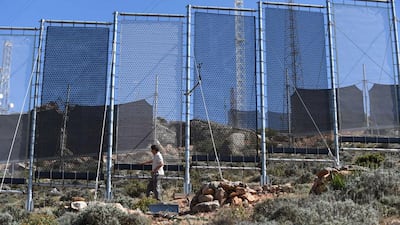SIDI IFNI, MOROCCO // Villagers in Morocco’s south-west mountains have turned to “fog harvesting”, a green technology that transforms fog into fresh water straight from the tap and puts an end to exhausting daily treks to distant wells by local woman.
Families in five highland Berber communities have begun to benefit from this water collection technique, which was devised in Chile two decades ago and has since been taken up in countries from Peru to Namibia and South Africa.
On the summit of a mountain named Boutmezguida, which looms over the villages at 1,225 metres, thick fog shrouds about 40 finely meshed panels designed to trap water and relay it to a network of pipes.
To have water running from a tap at home is a “revolution” for inhabitants of the semi-arid mountains known as the Anti-Atlas, says Aissa Derhem, the chairman of an active regional association called Dar Si Hmad for Development, Education and Culture (DSH).
DSH prides itself on having built “the world’s largest fog-collection and distribution system” and helping locals in the Sidi Ifni region to learn to operate it, after repeated droughts and scarce rain.
“Our rain here is the fog,” Mr Derhem says.
Tiny droplets are caught on the mesh while fog wafts through panels. The harvesters mix all they catch with more water derived from drilling, and then use this to supply villages on the lower slopes.
Mr Derhem first heard about fog harvesting 20 years ago. A few years later, upon returning to Sidi Ifni, he realised that the local climate was similar to that of the Andes in South America.
“Morocco has a lot of fog because of three phenomena: the presence of an anticyclone from the Azores (North Atlantic islands), a cold air current and a mountainous obstacle,” he says.
DSH joined forces with Fog Quest, a Canadian charity whose volunteers work in a range of developing countries. A decade’s work on refining fog harvesting techniques followed, and then, on March 22, World Water Day, North Africa’s first pilot project became operational.
Since then, “92 households, or nearly 400 people,” have enjoyed running water at home, says Mounir Abbar, the project’s technical manager.
The scheme will be extended to other villages and, in time, advocates hope, to other parts of the country.
In the village of Douar Id Achour, residents are proud of their new taps – and for good reason. Women and children used to spend an average of four hours a day on a round trip to a well, even longer in dry summer.
“I filled two 20 litre containers four times a day,” says Massouda Boukhalfa, 47. “But even those 160 litres wasn’t enough for us, because we have cattle as well.”
During droughts, water was carried in by tanker trunk. “That took a two weeks and cost 150 Morrocan dirhams (Dh57.3) for 5,000 litres on average,” another resident, Houcine Soussane, recalls.
According to DSH, 7,000 litres of fog water cost three times less than before, even with a fee of 20 Moroccan dirhams to each household.
It means that villagers now have more time to collect the nutty fruit of argan trees and extract its prized and potentially lucrative oil, which is used in cooking, skincare and easing arthritis. Reputed as an anti-ageing product, argan oil has been taken up abroad as an ingredient in high-end cosmetics.
“Our women and daughters no longer wear themselves out. They go to school and are safe,” says 54 year-old Lahcen Hammou Ali.
* Agence France-Presse

